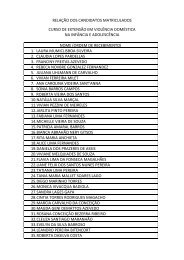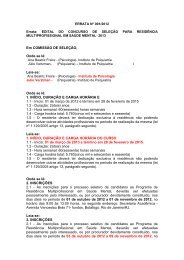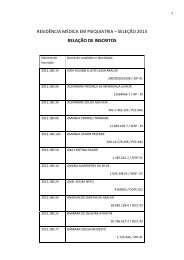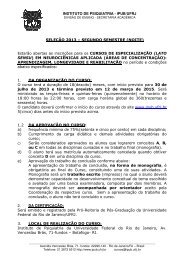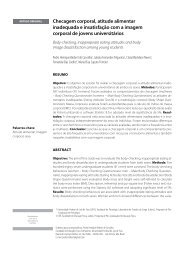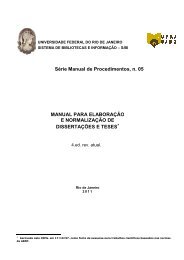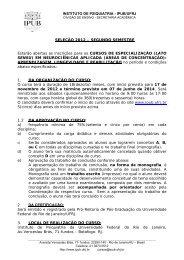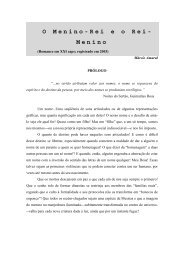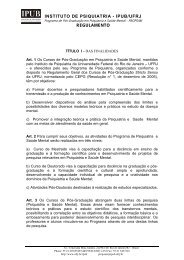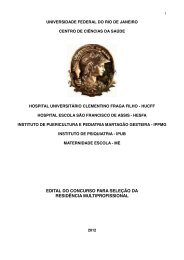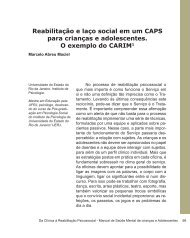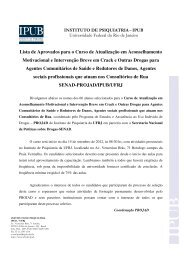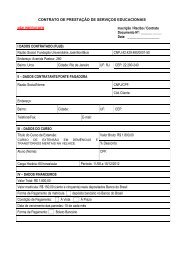Originais â Originals outubro | dezembro ⢠2011 - IPUB - UFRJ
Originais â Originals outubro | dezembro ⢠2011 - IPUB - UFRJ
Originais â Originals outubro | dezembro ⢠2011 - IPUB - UFRJ
You also want an ePaper? Increase the reach of your titles
YUMPU automatically turns print PDFs into web optimized ePapers that Google loves.
ORIGINAL artigo original ARTICLE<br />
Eating habits and psychopathology:<br />
translation, adaptation, reliability of the<br />
Nutrition Behavior Inventory to Portuguese<br />
and relation to psychopathology<br />
Hábitos alimentares e psicopatologia: tradução, adaptação,<br />
confiabilidade do Nutrition Behavior Inventory para o<br />
português e correlação com a psicopatologia<br />
Cássia Roberta Benko 1 , Antonio Carlos de Farias 2 , Mara L. Cordeiro 3<br />
ABSTRACT<br />
Keywords<br />
Eating habits,<br />
psychopathology, children,<br />
mental health.<br />
Objective: The Nutrition-Behavior Inventory (NBI) is a self-administered instrument that allows<br />
eating habits to be correlated with psychopathological symptoms. The objective was to translate<br />
and adapt the NBI to Portuguese, and test the Portuguese NBI’s reliability. The second aim was to<br />
verify its sensitivity for identification of risk factors in terms of behavior/eating habits in children and<br />
adolescents. Methods: The NBI was translated, adapted, and back-translated. The Portuguese<br />
version of the NBI was then applied (N = 96; 9-12 years). In order to verify the internal consistency,<br />
Cronbach’s alpha was used. The psychopathological indicators of the participants were accessed<br />
using the Child Behavior Checklist (CBCL). The mean CBCL scores were analyzed in relation to the<br />
NBI data (cutoff point: ≥ 30 with indicators, and < 30 without). Results: Internal consistency was<br />
high (Cronbach’s alpha = 0.89) for the NBI. The CBCL scores correlated significantly with NBI<br />
(> 30) on the following: anxiety and depression (p = 0.041), social difficulties (p = 0.028), attention<br />
problems (p = 0.001), aggressive behavior (p = 0.015); ADHD (p < 0.001), and conduct problems<br />
(p = 0.032). Conclusion: The present results indicate that the NBI is a reliable instrument. The<br />
NBI can be useful for evaluating psychopathological symptoms related to the eating habits and<br />
behaviors of children and adolescents.<br />
resumo<br />
Objetivo: O Nutrition-Behavior Inventory (NBI) é um instrumento de autorrelato que permite<br />
que os hábitos alimentares sejam acessados e correlacionados com sintomas psicopatológicos.<br />
O objetivo foi traduzir, adaptar e testar a confiabilidade do NBI para o português. O segundo<br />
Recebido em<br />
18/7/<strong>2011</strong><br />
Aprovado em<br />
31/10/<strong>2011</strong><br />
1 Pelé Pequeno Príncipe Research Institute, Department of Neuropsychopharmacology; Faculdades Pequeno Príncipe; Children’s Hospital<br />
Pequeno Príncipe, Department of Psychology, Curitiba, Brazil.<br />
2 Pelé Pequeno Príncipe Research Institute, Department of Neuropsychopharmacology; Faculdades Pequeno Príncipe; Children’s Hospital<br />
Pequeno Príncipe, Department of Neuropediatrics, Curitiba, Brazil.<br />
3 Pelé Pequeno Príncipe Research Institute, Department of Neuropsychopharmacology; Faculdades Pequeno Príncipe; University of California<br />
Los Angeles, Semel Institute for Neuroscience and Human Behavior, Department of Psychiatry and Biobehavioral Sciences of the<br />
David Geffen School of Medicine, United States.<br />
Address for correspondence: Mara L. Cordeiro<br />
Instituto Pelé Pequeno Príncipe,<br />
Departamento de Neuropsicofarmacologia<br />
Av. Silva Jardim, 1632, Água Verde – 80250-200 – Curitiba, PR, Brazil<br />
Tel.: (+55 41) 3310-1036/Telefax: (+55 41) 3322-1446<br />
E-mail: mcordeiro@mednet.ucla.edu



